Welcome to Sheep & Poultry
BRED EWES FOR SALE - 2020
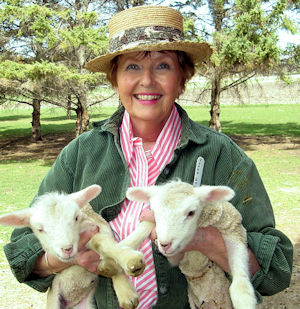 We have 3-4 bred ewes availalbe due to lamb in March or April of 2021. These are great stock for starting your own purbred Polypay sheep flock - all shots, wormed, tails docked and ear tags. Call 320 286-2865 if you would like to have more information of these purebred ewes.
We have 3-4 bred ewes availalbe due to lamb in March or April of 2021. These are great stock for starting your own purbred Polypay sheep flock - all shots, wormed, tails docked and ear tags. Call 320 286-2865 if you would like to have more information of these purebred ewes.
RENT A RAM
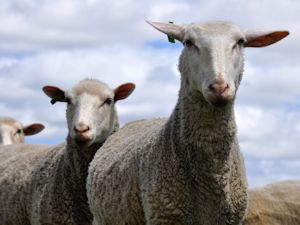 We have a wonderful Ram. He is handsome and huge with a great attitude. He is a wonderful example of a Polypay Ram.
We have a wonderful Ram. He is handsome and huge with a great attitude. He is a wonderful example of a Polypay Ram.
The only issue with him is that he only “works" for us one month of the year. We breed our Polypay ewes in November and the ram is busy doing his part. The rest of the year, he goofs off. We have to buy feed for him and that costs money.
We keep only "working" animals on the farm. Our chickens lay eggs. The eggs are used in my kitchen or are allowed to become baby chicks. The turkeys lay eggs that become more turkeys and eventually Thanksgiving and Christmas dinner. The Great Pyrenees dogs make puppies. These are sold as livestock guards or family pets.
It had begun to bother me that all the ram did most of the year was to loaf. I solved this problem, by “renting” the ram. He is spending this month at another farm that has female sheep. He is busy making lambs that will be born this spring.
My new “RENT A RAM” business works like this:
He must be picked up here at Milk and Honey Farm and returned in approximately five weeks.
He must be well taken care of and kept safe.
The ewes that he is visiting must be in good health, have their shots and be wormed.
The rental fee needs to paid in advance.Our Ram is available all year excepting for November 14th to December 30th.
We will have his lambs born in late April and early May. They will be available for sale in June. Deposits to reserve your lambs are now being accepted. Lambs must be picked up at our farm. Bob can help load up the lambs. (The deposit is $50.00 per lamb) The balance is due when the lambs are picked up.
For more information about the Ram rental and our new lambs, call Bob or Sarah at 320 286 2865.
SPRING LAMBS FOR SALE!

 We are celebrating Spring lamb sales, looking forward to the birthing of our Polypay lambs. Since Polypay sheep usually have multiple births, it is always fun to see the twins, triplets, and occasional quad lambs tagging after their Moms out in the pasture.
We are celebrating Spring lamb sales, looking forward to the birthing of our Polypay lambs. Since Polypay sheep usually have multiple births, it is always fun to see the twins, triplets, and occasional quad lambs tagging after their Moms out in the pasture.
We have ewe lambs and ram lambs for sale. They will be ready to go to their new homes toward the end of June. To reserve your Polypay lambs, call Sarah at (320) 286-2865.
We will post information on bottle lambs on the web site. Since the Polypay Moms sometimes give birth to four babies, we usually put the smallest baby on a bottle. They quickly learn to follow Sarah around the farm. We feed them from baby bottles with a lamb milk replacer mixture. It is fun for children to take on the care and feeding of a bottle lamb.
Here's Last Year's Lamb Story
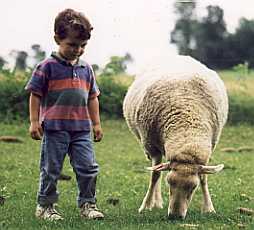

 There are three "bottle baby" lambs this year. Their names are "Samson", "Sunshine",
and "Molasses". All three, believe in their little hearts that I am their Mom. Four times a day, I mix up some lamb milk replacer, fill up the baby bottles, load up my basket, and head out to the barn. As soon as they hear the barn door open, they begin to call me. They let me know that they need me and the bottles NOW!!
There are three "bottle baby" lambs this year. Their names are "Samson", "Sunshine",
and "Molasses". All three, believe in their little hearts that I am their Mom. Four times a day, I mix up some lamb milk replacer, fill up the baby bottles, load up my basket, and head out to the barn. As soon as they hear the barn door open, they begin to call me. They let me know that they need me and the bottles NOW!!
Samson, the ram lamb, and his sister, Sunshine, both drink their bottles standing up and pushing their noses through the lamb pen. Molasses, however, needs to be held on my lap, while she drinks her bottle. When her tummy gets full, she often falls asleep in my arms.
The way they became bottle lambs started out with a rough beginning. Samson and Sunshine’s Mom had four babies. She could not care for them all, so I took over on two of them. They caught on very fast and now follow me around the barn. Their favorite place is directly under my feet. Molasses’s Mom had twins. She loved one twin and rejected the other one. Bob poured molasses over the top of the rejected baby, in the hopes that it would taste and smell good to the Mom. It did not work, so we named her Molasses and she joined my bottle babies in their special pen.
My bottle babies will be for sale, along with the other new lambs that have been arriving. They will be ready to go to their new homes when they weight about 30 pounds. Right now, they are about the size of my barn cats. They will need to be on the bottles for another two or three weeks and then I will start them on some creep feed and Alfalfa hay. We will go for walks in the pasture, so they can nibble on the spring grass.
Of all the spring lambs, these babies will be the tamest. They like people and are easy to handle. I hope someone who wants a 4H project will buy them. They will make great pets for children too. If you are interested in buying my Bottle Babies, give me a call at (320) 286-2865 or send an email. I will get right back to you. These little ones are special. Good things can come from a rough beginning. I will miss them.
Sheep In Winter
Our sheep are big and wooly and they sparkle when covered with frost. We put the Ram out with the ewes on November, and expect lambs in April 2006. The big girls seem to like the heavy snow and make their rounds of the pasture each morning and evening. They lounge around in the deep straw in the barn during most of the day. Then, toward evening, they will plow through the snow and make their rounds again.
Boomer, Kodi, and Ginger, our Great Pyreness guard dogs, move around with the sheep. We have heard coyotes howling at night, but do not worry. The big dogs will take good care the sheep.
The sheep all have wool that is long and will be ready for shearing in March 2006. Except for one twin size comforter, all the comforters made from last years wool have been sold. They are a popular item around the Christmas season. I have started a waiting list to reserve a comforter made with wool from spring 2006. If this interests you, email or call Sarah at (320) 286-2865.
I enjoy my sheep as they peacefully wait for the new grass and the new lambs of spring. Meanwhile, they rest in the calm and quiet of winter.
New Lamb Feeding
Down on the farm video. See how we take care of the new lambs by making sure they get a quick meal. You'll need a Weak Lamb kit, available from Jeffer's. You'll need a high-speed connection to view this video and either Windows Media player or Real Player.
The Sheep & Poultry
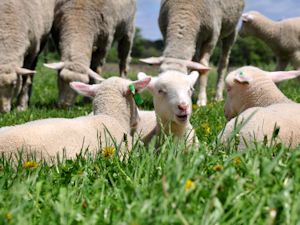 Our Polypays are pure-bred and come from excellent stock. They are not registered. The lambs will be healthy and up to date on their shots and worming when they are picked up. Bob always spends quality time with new owners to show them how to care for the lambs.
Our Polypays are pure-bred and come from excellent stock. They are not registered. The lambs will be healthy and up to date on their shots and worming when they are picked up. Bob always spends quality time with new owners to show them how to care for the lambs.
When the lambs are born, they stay in a small area with the ewe - called a jug. This helps the ewe and lamb bond together. After a few days, they are moved in with another ewe and lamb(s). In a week, they are ready to go into a community of ewes and lambs where they all socialize, but the lambs can quickly come the ewe when she calls.
Late in the evening, the ewes and lambs are let out to enjoy some grass. We do it late so they don't get too much grass at one time. Later on, they're free to come and go, like these lambs, who are enjoying napping in the mid-day sun.
Our Polypay sheep are dual purpose - producing both meat and wo ol. Bob is giving the ewes a corn treat. The lambs at left are three weeks old. Honey Bear, our female Great Pyrenees guard dog, watches over the lambs. On the right, some of the Spring 2000 lambs with their moms out for a romp on the new grass.
ol. Bob is giving the ewes a corn treat. The lambs at left are three weeks old. Honey Bear, our female Great Pyrenees guard dog, watches over the lambs. On the right, some of the Spring 2000 lambs with their moms out for a romp on the new grass.
 This ewe is cleaning off her newborn lambs. Even though a few minutes old, the lambs push to their feet and begin to seek mom for milk. It is vitally important that newborns receive the nourishing colostrum milk from the ewe as these lambs did. Sometimes lambs are too weak or too cold and need help. Intervention by the shepherd can prevent losses in this critical stage in the lamb's life.
This ewe is cleaning off her newborn lambs. Even though a few minutes old, the lambs push to their feet and begin to seek mom for milk. It is vitally important that newborns receive the nourishing colostrum milk from the ewe as these lambs did. Sometimes lambs are too weak or too cold and need help. Intervention by the shepherd can prevent losses in this critical stage in the lamb's life.
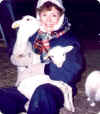 Lamb kisses are special. Baby lambs tend to be trusting and affectionate. Polypays regularly have multiple births - 2 is typical, but 3 is common and sometimes 4. The ewes have easy births, are good moms, and they give lots of milk, sometimes up to a gallon a day. We lamb in the spring so to give the lambs summer grass. Each lamb will gain 5 pounds per week up to market weight.
Lamb kisses are special. Baby lambs tend to be trusting and affectionate. Polypays regularly have multiple births - 2 is typical, but 3 is common and sometimes 4. The ewes have easy births, are good moms, and they give lots of milk, sometimes up to a gallon a day. We lamb in the spring so to give the lambs summer grass. Each lamb will gain 5 pounds per week up to market weight.
 Sarah moving the sheep, ducks and geese toward the barn for their winter ration of hay and grain. Normally, the sheep come and go as they please, but when we know the weather will be exceptionaly bad, we put them in the barn.
Sarah moving the sheep, ducks and geese toward the barn for their winter ration of hay and grain. Normally, the sheep come and go as they please, but when we know the weather will be exceptionaly bad, we put them in the barn.

 Our first official farm animal was the lowly egg-laying chicken. We learned a lot working with chickens and when we did something wrong and lost one, it was not a big loss like losing a sheep. Later, we added ducks and geese. You would think that everybody would just get along fine, but that is not the case. They are completely different in their behavior and tolerate each other at best. During the warmer months, we have extra eggs to sell to the neighbors which helps pay for the organic chicken feed.
Our first official farm animal was the lowly egg-laying chicken. We learned a lot working with chickens and when we did something wrong and lost one, it was not a big loss like losing a sheep. Later, we added ducks and geese. You would think that everybody would just get along fine, but that is not the case. They are completely different in their behavior and tolerate each other at best. During the warmer months, we have extra eggs to sell to the neighbors which helps pay for the organic chicken feed.
We sell breeding stock, wool comforters, sheepskins, and locker lambs. We would not be considered a sheep producer, but rather people who integrate livestock into a sustainable lifestyle. Used bedding straw and manure makes wonderful mulch for the garden to control weeds and retain moisture. Garden leftovers and special root crops like red sugar beets feed the sheep in late summer and fall.

Our Polypay lambs will be arriving in April- May of 2008. We sell them in June when they weigh about 30 pounds. All lambs have to be picked up here at Milk and Honey Farm. Several years ago, we had a rancher from Colorado buy a Great Pyrenees puppy and 10 lambs. The pup sat on the front seat of the pickup and the lambs were hauled behind in a horse trailer all the way home to Colorado.
 We sell the lambs mostly to people who want to breed them or who want to raise meat for the table. We have also sold quite a few for 4-H projects and for "pets". There will be both ram lambs and ewe lambs for sale. There is a waiting list of folks wanting to purchase our lambs. If you are interested or have questions, please email or call Sarah at (320) 286-2865.
We sell the lambs mostly to people who want to breed them or who want to raise meat for the table. We have also sold quite a few for 4-H projects and for "pets". There will be both ram lambs and ewe lambs for sale. There is a waiting list of folks wanting to purchase our lambs. If you are interested or have questions, please email or call Sarah at (320) 286-2865.


